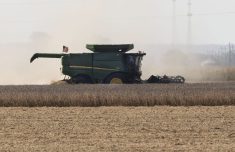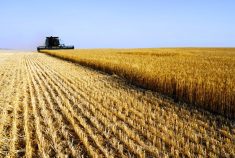The Canadian Cancer Society isn’t calling for a ban on glyphosate. The Society says it’s acceptable to use pesticides to produce food, if the products are used judiciously.
Last month the International Agency for Research on Cancer, a division of WHO, issued a statement on the safety of five pesticides, including glyphosate, the active ingredient in Roundup and the most widely used herbicide in the world.
After reviewing the published literature, IARC experts said glyphosate should be classified as a Group 2A substance: probably carcinogenic to humans.
Read Also

Alberta harvest wrapping up: report
Harvest operations advanced to 96 per cent complete in Alberta as of Oct. 7, with only a few late-seeded cereal and canola fields remaining, according to the latest provincial crop report.
A number of environmental groups, including the Canadian Association of Physicians for the Environment (CAPE), said the IARC finding proves that glyphosate should be banned for agricultural and residential use.
The Cancer Society has a more nuanced position.
Gillian Bromfield, director of cancer control policy with the Society, said the organization opposes the use of pesticides for lawns and public green spaces. However, if the benefits outweigh the risks, agricultural pesticides are acceptable.
“The cosmetic use of pesticides provides no health benefit and may cause harm,” Bromfield said in an email. “(But) we believe that when pesticides have been shown to be necessary to protect our health, safety or food supply, they should be part of a plan that includes using the smallest amounts possible, and the safest options must be chosen.”
Bromfield said the IARC scientists follow a transparent process to assess the existing research on products like glyphosate.
“IARC concluded it was a possible carcinogen (Group 2A) based on limited evidence from workplace exposures – mostly agricultural – in the USA, Canada and Sweden. They also highlighted evidence that glyphosate can cause cancer in laboratory animals,” she said. “Continuing research on pesticides and potential links to adverse human health outcomes is important to ensure those using or being exposed to pesticides, particularly at higher levels, are as safe from harm as possible.”
In 2012, Bromfield told the Western Producer that there is “good, quality research” suggesting a link between pesticide exposure and cancer.
But there is little evidence of pesticide residues, on food, causing cancer.
“Nationally or internationally, there’s no research I’m aware of that has shown an increased risk from low-level pesticide residue on vegetables and fruit,” she said.
“We do encourage farming practices that reduce pesticides to minimize exposure for farm workers and farm communities … but I can state quite clearly that we aren’t advocating for a movement towards organic farming.”
Like the Cancer Society, the Canadian Medical Association says chemicals, including pesticides, should be evaluated according to benefit vs. risk.
The CMA’s policy on Chemical Contamination and Human Health says:
“Chemicals, properly managed, can and will continue to provide enormous benefits to society, but caution is warranted because of the potential health consequences.”
The CMA says IARC classifies 40 registered pesticides as probably or possibly carcinogenic and long-term exposure has been linked to immune suppression, hormonal disruption and birth defects.
“Many individual pesticides can be safely used,” the CMA said. “(But) there is a lack of research on the effect of certain pesticides when used in combination.”
Contact robert.arnason@producer.com

















